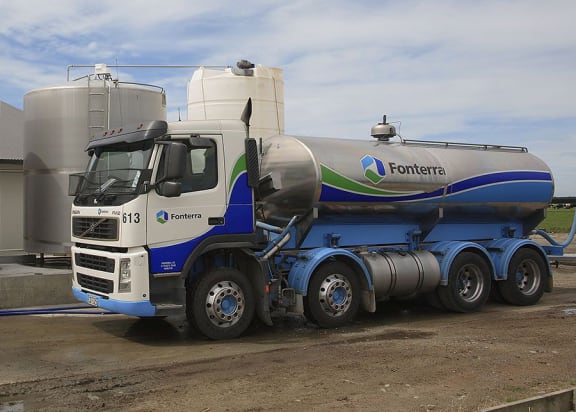Fonterra's share price slumped more than 5% on Wednesday after the company surprised farmers and investors by slashing its forecast payout.
New Zealand's largest company cut its dividend payout to investors, while leaving the milk price it pays its farmers unchanged.

Photo: RNZ
Fonterra is required to consider its farmgate milk price every quarter as a condition of the Dairy Industry Restructuring Act.
The company has reduced the dividend by two-thirds from 32 cents per share to 10 cents a share and left the milk price unchanged at $8.30 per kilo of milk solids.
Fonterra said on Wednesday it can't physically produce any more milk powder, which sets the price farmers receive. If it could, the price would be $9 per kilo.
Fonterra blames a huge price gap between milk powder and other dairy products for the dividend cut. Chairman John Wilson said milk powders, which make up 70% of the company's total production, are continuing to sell at very high prices and this is benefiting farmers and New Zealand.
However, the high farmgate milk price is squeezing the margins of higher valued products such as cheese and casein, which is generating much lower returns. Mr Wilson said the price gap between the two streams is estimated at $800 million.
Investors and farmers are disappointed, after expecting a higher return on the back of strong global prices. However, economists point out that the payout, as it stands, will pump an extra $5 billion into the economy.
While the forecast milk payout stays unchanged, Fonterra said it is increasing its monthly advance payments to farmers by 30 cents to $5.80 per kilo from January 2014.
Fonterra also forecast earnings before interest and tax for the year to July 2014 at between $500 and $600 million.
Units in Fonterra Shareholders Fund, which anyone can invest in, fell as low as $5.58 from $6.10 on Tuesday.
Meanwhile, Fonterra has announced plans to build a new milk powder plant at its Pahiatua site in response to the increase in North Island milk supply which forced it to dump some lower value products at the peak of milk production two months ago.

